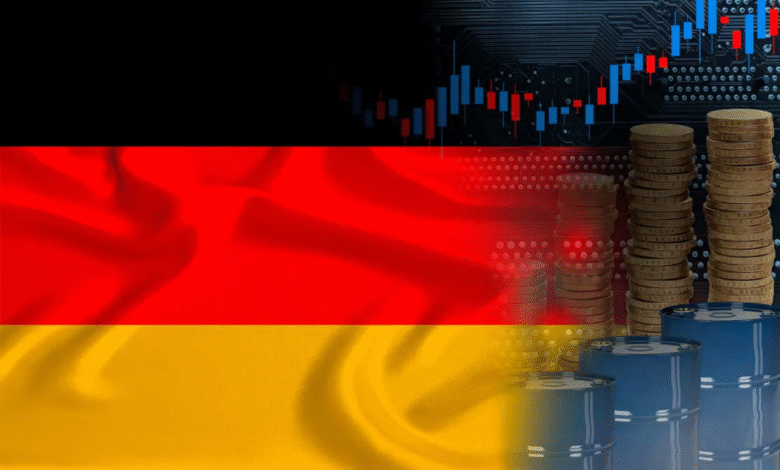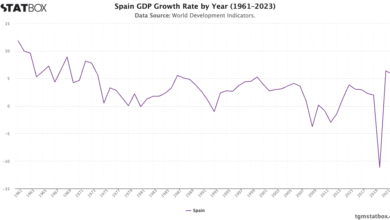Germany Economy Strategy: Katherina Reiche’s Bold Plan

Germany’s economy strategy is currently under the spotlight as the newly appointed economy chief, **Katherina Reiche**, outlines her vision to revitalize the nation’s sluggish economic landscape. Emphasizing the urgency for infrastructure investment, she highlights the necessity for a balanced approach that encompasses both public funding and substantial private capital. With Germany teetering on the edge of recession, her roadmap aims to break the cycle of stagnation through innovative economic reform and swift action on pressing issues like energy supply and construction costs. As she prepares Germany for a decade of transformative investments, Reiche warns that the heavy weight of regulatory constraints could stifle growth unless addressed. The call for a comprehensive strategy to attract private sector investment rings crucial for ensuring Germany’s economic resilience in the face of ongoing global challenges.
In light of the current economic challenges facing Germany, the government’s approach to economic revitalization can be framed as a critical strategy for sustainable growth. With the leadership of **Katherina Reiche**, officials are pushing for comprehensive reforms aimed at stimulating infrastructure development and attracting private capital to the market. The country’s recent struggles, including two years of economic contraction, underline the need for decisive policy changes and investment in key sectors. By fostering an environment conducive to innovation and entrepreneurship, Germany hopes to emerge from the specter of recession and reinforce its position within the global economy. As Reiche emphasizes the need for speed and risk-taking, the formulation of a robust framework for infrastructure investment stands as a vital component in reversing the tide of economic stagnation.
Germany’s Infrastructure Investment Priorities
Germany’s economy is at a critical juncture, and the focus on infrastructure investment is pivotal to its recovery strategy. As outlined by Katherina Reiche, the new Minister for Economic Affairs and Energy, the country plans to shift towards heightened infrastructure spending, particularly in energy, telecommunications, and transportation. By prioritizing these areas, Reiche indicates that Germany aims not only to stimulate immediate economic activity but also to lay the groundwork for sustainable growth over the next decade.
This ambitious infrastructure strategy aims to attract private capital to complement public investments, addressing the reality that while public funds can cover only a fraction of needed investment, private sector involvement is crucial. With approximately 90% of necessary funding expected to come from private sources, adjusting regulations and boosting investor confidence will be essential. The aim is to create an environment where private capital can thrive, allowing for greater flexibility and innovation in infrastructure development.
The Role of Private Capital in Germany’s Economic Recovery
Private capital stands as a linchpin in Germany’s forthcoming economic strategy. Katherina Reiche emphasizes that encouraging private investment is vital for overcoming the limitations of public funding. This strategic pivot is particularly significant given the challenges Germany faces, including infrastructure deficits and competition in key sectors like automotive manufacturing. By harnessing private capital, Germany hopes to not only repair its aging infrastructure but also invigorate its economy towards recovery.
Moreover, the reliance on private investment indicates a move away from traditional economic models that were heavily reliant on public spending. As Germany navigates through a period of recession and economic stagnation, fostering a conducive environment for private investors becomes increasingly urgent. Reiche’s roadmap includes regulatory reforms designed to unlock potential in technology and innovation sectors, ensuring that private entities can engage without the constraints often posed by bureaucratic red tape.
Navigating Economic Reform in Germany
The call for economic reform in Germany aligns with the urgent need for a turnaround in its sluggish economy. Reiche’s agenda highlights not only the push for infrastructure investments but also a broader effort to reform regulations deemed obstructionist to growth. Veronika Grimm, an economic expert, reiterates this need for regulatory adjustments, emphasizing that outdated laws must evolve to foster innovation and encourage investment. This reformative approach is aimed at revamping Germany’s economic fabric.
As the economy hovers on the brink of recession, these reforms are integral to addressing systemic challenges. By creating a more flexible regulatory environment, Germany can attract both domestic and foreign investment. Such reforms, coupled with robust infrastructure spending and energy price stabilization efforts, could potentially set the stage for a revitalized economic landscape, paving the way for recovery and growth.
Impact of Regulatory Changes on Investment Climate
Regulatory changes will play a pivotal role in reshaping the investment climate in Germany. Katherina Reiche points to the need for adapting existing laws to prevent stifling innovation and investment, particularly for start-ups and emerging tech ventures. The German government’s commitment to regulatory reform signifies a proactive approach, aiming to remove barriers that have historically hindered economic growth.
Furthermore, these regulatory frameworks must evolve alongside the fast-changing global economic landscape. By ensuring that regulations stimulate rather than inhibit, Germany can enhance its attractiveness to both local and international investors. With the right balance, Germany might cultivate an environment that not only manages risks but also capitalizes on them, driving its economy forward amid challenging circumstances.
Germany on the Edge of Recession: An Overview
Germany’s precarious economic landscape is underscored by a slight contraction in GDP over the past few years, placing the country on the verge of recession. The frequent fluctuations between growth and contraction have raised alarms, necessitating a fresh approach to economic management. As outlined by Reiche, key challenges lie within energy prices, regulatory burdens, and overall economic stagnation, which have impeded growth and stability.
Addressing this economic malaise requires strategic planning and decisive action. By focusing on infrastructure investments and regulatory reforms, the government aims to rejuvenate sectors that have been stagnating. The emphasis on stabilizing energy supply and reducing bureaucracy will be crucial components in steering the economy away from recession and back toward growth.
Germany’s Economic Strategy and Future Outlook
The strategic roadmap initiated by Katherina Reiche encapsulates Germany’s approach to addressing its economic challenges head-on. This includes a substantial focus on transforming infrastructure in a bid to foster economic revival and attract private investment, positioning the country for long-term sustainability. However, the success of this strategy will largely depend on swift execution and the ability to navigate external economic pressures.
Looking ahead, the principle of adaptability will be vital as Germany confronts potential recessions and economic unpredictability. By refining its strategies around infrastructure investment and regulatory reforms, the new government can establish a resilient framework that not only seeks recovery but also champions innovation and economic dynamism for the future.
Challenges Facing Germany’s Key Industries
Germany’s key industries are currently grappling with significant challenges that threaten their position in the global market. The automotive sector, for instance, faces fierce competition from Chinese manufacturers, necessitating innovations and cost-effective solutions to maintain its competitiveness. Furthermore, increased construction costs and bureaucratic inefficiencies are complicating infrastructure and housing development, hindering the country’s recovery efforts.
Addressing these sectoral challenges is crucial for the holistic improvement of Germany’s economy. Katherina Reiche’s push for infrastructure investment directly aims to mitigate these issues by fostering a supportive environment for growth. By addressing the root causes of stagnation, including regulatory burdens and competition pressures, Germany can hope to revitalize its key industries and boost overall economic performance.
The Future of Economic Reform in Germany
The continuous evolution of economic policies will define the future of growth in Germany. With Katherina Reiche at the helm, the emphasis has shifted toward a more dynamic regulatory framework that seeks to invigorate both public and private sectors. The forthcoming changes aim to enhance investment confidence, a necessary precursor for sustained economic recovery.
Future economic reforms must be accompanied by vigilance against external pressures that can disrupt domestic stability. As global market conditions fluctuate, Germany’s ability to adapt its economic strategy will be crucial. Emphasizing innovation, reducing bureaucratic barriers, and fostering private investment will be essential components for resilience against economic uncertainties.
The Importance of Speed in Economic Recovery
Speed is of the essence in Germany’s pursuit of economic recovery. As Katherina Reiche emphasized, the urgency to implement infrastructure investments cannot be overstated, particularly at a time when the economy is grappling with stagnation and nearing recession. Rapid deployment of funds and streamlined processes can significantly impact restoring investor confidence and economic growth.
Moreover, transitioning to a faster-paced investment model will require addressing the cumbersome regulatory landscape that has traditionally slowed down project initiation and completion. Efforts to enhance the speed of infrastructure development, supported by private capital, can provide the immediate boost the German economy needs to break away from the cycle of stagnation.
Frequently Asked Questions
What is Katherina Reiche’s role in shaping Germany’s economy strategy?
Katherina Reiche, Germany’s Minister for Economic Affairs and Energy, plays a pivotal role in shaping the country’s economy strategy by proposing significant reforms focused on accelerating infrastructure investments and reducing economic stagnation. Her approach emphasizes taking calculated risks and leveraging private capital to rejuvenate the economy and enhance competitiveness.
How does Germany plan to enhance infrastructure investment as part of its economic strategy?
Germany’s economic strategy, led by Katherina Reiche, plans to enhance infrastructure investment by prioritizing projects in energy, telecommunications, and transportation. Reiche advocates for a ten-year roadmap that aims to mobilize private capital for 90% of the required investments while using public funds for the remaining 10%, ultimately to boost economic growth.
What challenges does Germany face related to its economic strategy and risk-taking?
Germany’s economic strategy faces challenges including regulatory barriers that may hinder investment. Katherina Reiche has called for reform to address innovation-stifling regulations, which could prevent companies, especially startups, from taking the necessary risks to invest in new technologies and infrastructure.
How is Germany addressing its economic recession through its new economic strategy?
In response to recent economic contractions, Germany is addressing its recession through a comprehensive economic strategy under Katherina Reiche, which includes lowering energy prices, stabilizing energy supply, and implementing a substantial 500-billion-euro infrastructure package designed to stimulate growth and attract private investment.
What role does private capital play in Germany’s economic strategy?
Private capital is crucial in Germany’s economic strategy, as emphasized by Katherina Reiche. With 90% of the needed investments in infrastructure and reform relying on private funding, the strategy aims to create an attractive environment for investors, further driving economic growth and innovation in the country.
What kind of regulatory reforms are needed for Germany’s economic strategy to succeed?
For Germany’s economic strategy, regulatory reforms are essential to reduce bureaucratic barriers that currently stifle innovation and investment. Katherina Reiche and experts suggest adjusting restrictive regulations to foster a more dynamic economic landscape, enabling companies to take calculated risks and pursue growth opportunities.
How does Germany’s infrastructure investment plan relate to long-term economic recovery?
Germany’s ambitious infrastructure investment plan is fundamentally linked to its long-term economic recovery strategy. By focusing on enhancing infrastructure across various sectors, Katherina Reiche aims to stimulate growth, create jobs, and improve overall productivity, which are essential for overcoming the economic difficulties posed by recession.
What is the expected impact of the new economic strategy on Germany’s recession fears?
The new economic strategy, spearheaded by Katherina Reiche, is expected to mitigate fears of recession by fostering an environment ripe for growth, through strategic infrastructure investments and regulatory reforms designed to encourage private capital participation. This approach aims to stabilize and revitalize the economy while addressing underlying challenges.
| Key Points | Details |
|---|---|
| Katherina Reiche’s Plan | Call for increased risks and investment in infrastructure. |
| Infrastructure Investment | Focus on bridges, energy, telecommunications, and maritime infrastructure over the next decade. |
| Investment Source | 10% public funding; 90% reliant on private capital. |
| Regulatory Challenges | Stricter regulations could hinder investments and stifle innovation. |
| Economic Status | Slight contraction in 2023 and 2024; issued a zero growth forecast for 2025. |
| Key Focus Areas | Lowering energy prices, stabilizing energy supply, and reducing bureaucratic hurdles. |
| Fiscal Changes | 500-billion-euro infrastructure package and changes to debt rules for defense spending. |
| Challenges in Key Industries | Automotive sector facing competition; construction impacted by costs and bureaucracy. |
Summary
Germany economy strategy is focused on revitalizing the nation’s economic landscape through substantial investments and regulatory adjustments. With Katherina Reiche leading the charge, the government aims to foster a decade of infrastructure development, leveraging both public and private funding. While the economy has experienced stagnation and slight contractions, the emphasis on innovation-friendly regulations and reductions in bureaucratic barriers is essential for future growth. The commitment to strategic investments in energy and technology sectors, along with addressing key industry challenges, exemplifies a proactive approach to economic revitalization.



